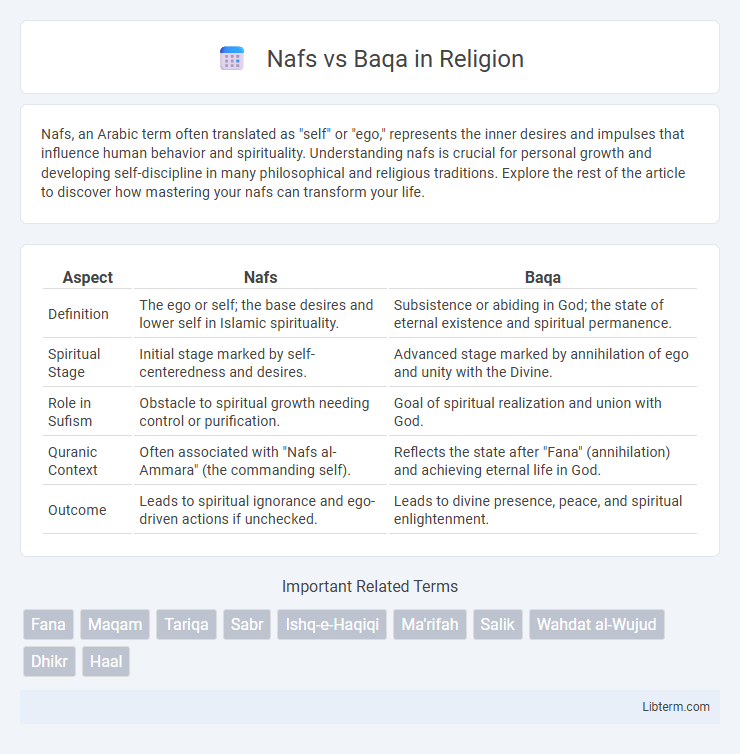Nafs, an Arabic term often translated as "self" or "ego," represents the inner desires and impulses that influence human behavior and spirituality. Understanding nafs is crucial for personal growth and developing self-discipline in many philosophical and religious traditions. Explore the rest of the article to discover how mastering your nafs can transform your life.
Table of Comparison
| Aspect | Nafs | Baqa |
|---|---|---|
| Definition | The ego or self; the base desires and lower self in Islamic spirituality. | Subsistence or abiding in God; the state of eternal existence and spiritual permanence. |
| Spiritual Stage | Initial stage marked by self-centeredness and desires. | Advanced stage marked by annihilation of ego and unity with the Divine. |
| Role in Sufism | Obstacle to spiritual growth needing control or purification. | Goal of spiritual realization and union with God. |
| Quranic Context | Often associated with "Nafs al-Ammara" (the commanding self). | Reflects the state after "Fana" (annihilation) and achieving eternal life in God. |
| Outcome | Leads to spiritual ignorance and ego-driven actions if unchecked. | Leads to divine presence, peace, and spiritual enlightenment. |
Understanding Nafs: The Lower Self
Nafs, or the lower self, represents the base desires and ego-driven impulses that challenge spiritual growth in Islamic teachings. It manifests through cravings, anger, and selfishness, constantly urging humans to prioritize worldly pleasures over divine guidance. Mastery over the nafs is essential to transcend its control, paving the way toward baqa, a state of eternal subsistence in unity with God.
Defining Baqa: The State of Spiritual Subsistence
Baqa, in Islamic spirituality, defines the state of spiritual subsistence where the soul remains in constant connection with the Divine presence after the annihilation (Nafs) of the self. This stage signifies enduring divine existence, contrasting with Nafs, which entails the ego-driven self and its desires. Achieving Baqa reflects ultimate spiritual fulfillment and continuous awareness in God's reality.
Historical Context: Nafs and Baqa in Islamic Thought
Nafs and Baqa are central concepts in Islamic spirituality, particularly within Sufi traditions where nafs represents the ego or lower self prone to desires and deviations, while baqa signifies the state of divine subsistence or enduring spiritual presence after the ego's annihilation (fana). Historically, classical scholars such as Al-Ghazali and Ibn Arabi elaborated on the inner struggle against the nafs as essential for attaining baqa, marking a key stage in the journey toward spiritual perfection and closeness to Allah. This dialectic reflects the transformative process emphasized in Islamic mysticism, where controlling the nafs leads to the ultimate realization of baqa as a state of eternal spiritual life united with the Divine.
The Role of Nafs in Personal Growth
Nafs, often defined as the ego or self, plays a crucial role in personal growth by serving as the battleground for self-discipline and spiritual refinement. Managing the nafs through mindfulness and ethical practices allows individuals to transcend base desires, fostering inner strength and resilience. This transformative process is essential for achieving baqa, the state of eternal subsistence in the presence of the Divine.
The Journey from Nafs to Baqa
The journey from Nafs to Baqa represents a profound spiritual transformation in Sufi mysticism, where the soul progresses from the ego-driven self (Nafs) to a state of divine subsistence (Baqa). This path involves rigorous self-purification, relinquishing worldly attachments, and achieving annihilation of the ego (Fana) to realize unity with the Divine presence. The attainment of Baqa signifies permanent spiritual existence, where the believer continuously embodies divine attributes and lives in eternal awareness of God.
Stages of Purifying the Nafs
The stages of purifying the Nafs involve distinct phases including Nafs al-Ammara (the commanding self prone to base desires), Nafs al-Lawwama (the self-reproaching conscience that struggles with inner conflicts), and Nafs al-Mutmainna (the peaceful soul achieved through spiritual discipline). Progressing through these stages is essential before reaching Baqa, which signifies a state of lasting subsistence in God, transcending the ego. The transformative journey from Nafs to Baqa requires rigorous self-purification, constant remembrance (Dhikr), and surrender to divine will, ensuring the soul attains ultimate spiritual realization.
Achieving Baqa: Spiritual Techniques and Practices
Achieving Baqa requires transcending the egoic self or Nafs through disciplined spiritual techniques such as rigorous dhikr (remembrance of God), deep meditation, and consistent adherence to Sharia-based ethical conduct. Sufi practices emphasize annihilation of the Nafs (fanaa) to reach a sustained state of divine subsistence or Baqa, characterized by continuous awareness and presence in God's essence. Mastery of these transformative practices facilitates the shift from self-centered desires toward eternal spiritual realization and union with the Divine.
Nafs vs Baqa in Sufi Teachings
Nafs represents the ego or lower self in Sufi teachings, symbolizing desires and earthly attachments that must be purified through spiritual practices. Baqa refers to the state of eternal subsistence in God, achieved after the annihilation (fana) of the nafs, where the Sufi attains unity with the Divine presence. The transformative journey from nafs to baqa embodies the core Sufi path of self-purification, enlightenment, and divine realization.
Inner Struggle: Overcoming the Ego
The inner struggle between Nafs and Baqa centers on transcending the ego's desires and illusions to achieve spiritual permanence. Nafs represents the self-driven ego demanding worldly gratification, while Baqa signifies the state of abiding in divine presence beyond self-attachment. Overcoming Nafs involves disciplined self-purification and surrender, enabling the soul to attain Baqa's enduring spiritual realization.
Nafs and Baqa: Contemporary Relevance
Nafs represents the ego or self that often drives desires and attachments, serving as a key concept in understanding human inner struggles in spiritual psychology. Baqa signifies the state of eternal subsistence with the Divine, transcending the ego's limitations after overcoming the nafs through spiritual purification. Contemporary relevance lies in addressing mental health and self-awareness by integrating nafs regulation with the pursuit of baqa, fostering inner peace and resilience in modern life challenges.
Nafs Infographic

 libterm.com
libterm.com